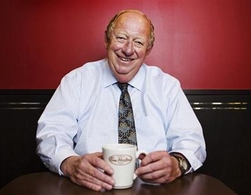 Tim Hortons Inc named a long-time Nestle executive as its new chief on Wednesday, a job that will be no easy task given drooping demand at the Canadian coffee and doughnut chain and a push by a U.S. hedge fund for better returns.
Tim Hortons Inc named a long-time Nestle executive as its new chief on Wednesday, a job that will be no easy task given drooping demand at the Canadian coffee and doughnut chain and a push by a U.S. hedge fund for better returns.Shares of Tim Hortons, which boasts that it sells eight of every 10 cups of coffee sold in Canada, fell more than 2.5 percent after the company posted its first decline in established store sales since its 2006 initial public offering.
The company, under pressure from hedge fund Highfields Capital to boost shareholder returns, said it is considering the Boston-based fund's key demands. But any change will await its new CEO, Nestle veteran Marc Caira, a 59-year-old Canadian.
Highfields wants the chain to take on new debt to buy back shares and believes that Tim Hortons' U.S. returns do not justify further investment there.
It also wants the company to enter into less capital-intensive franchise deals in the United States or scrap its U.S. expansion plans, according to documents seen by Reuters.
Interim CEO Paul House said Tims won't pull back from the U.S. market, but is studying a plan to work with well-funded franchisees who could operate multiple locations there.
The chain also announced on Wednesday a franchise deal with Apparel FZCO to open as many as 100 restaurants in Saudi Arabia in the next five years. That follows a deal with Apparel to open up to 120 locations in several Arab states, including Qatar and Kuwait.
"These are the type of deals they should be doing - these royalty deals, where they don't take on any of the risk and get all the reward," said Barry Schwartz, a portfolio manager at Baskin Financial, which owns about 130,000 Tim Hortons shares. "This is the type of structure they should follow in the U.S."
Tim Hortons said it will also consider taking on additional debt and study what would be its "optimal" capital structure considering historically low interest rates. Increased debt could affect its tax rate and investment grade credit rating, it warned.
But executives said they had already considered and rejected a Highfields proposal to create a real estate investment trust to house Tim Hortons property assets because it would not create significant value.
GROWTH CHALLENGE
The company said tough conditions in the first quarter led to heightened competition and drove sales down at established stores by 0.5 percent in the United States and 0.3 percent in Canada.
Other restaurant operators also faced a difficult first quarter, Schwartz said, given issues ranging from poor weather to nervous consumers.
"That's not particular to Tim Hortons. Take a look at every single food company that's reported over the past week."
Despite disappointing results for the first quarter, the company has performed well since its IPO. But analysts now question if the brand, as much a Canadian symbol as hockey and the Maple Leaf flag, has room for further growth at home.
With some 3,400 company-owned and franchised stores in Canada, it faces a tough fight for market share as rivals such as McDonald's and Starbucks (SBUX.O) step up their presence.
Tim Hortons said it will roll out a number of plans to drive same-store sales growth this year, including new menu items along with marketing and promotional programs.
It also announced an agreement with RealCup to sell its coffee in the form of capsules used in Keurig single-cup coffee makers, starting in July. That follows its 2012 launch of pods for Kraft's Tassimo coffee makers.
PLAN TO DRIVE SALES
Tim Hortons said Caira will take over from House on July 2. The company had spent nearly two years searching for a new chief executive.
House will become non-executive chairman of Tim Horton's board when Caira takes over. Caira, most recently the global head of Nestle Professional, will be nominated as a director at Tim Hortons' annual meeting in Toronto on Thursday.
Caira has also worked a Nestle Canada and Parmalat Canada.
"Caira comes with an almost made-to-order resume - solid international experience including the U.S. and in the food services segment, specifically the hot beverage and food sectors," said Scotiabank analyst Patricia Baker in a note.
"That he is also a Canadian with experience leading in a Canadian company tops it off."
Tim Hortons also said it has retained a "highly regarded search firm" to help it look for two replacement directors.
Highfields, among its other demands, wants the company to bring in new directors with more financial expertise.
TOUGH QUARTER
First-quarter results were soft, as expected, the company said. Earnings declined despite a 1.4 percent rise in revenue to C$731.5 million ($727.9 million).
Net income was C$86.2 million, or 56 Canadian cents per share, down from C$88.8 million, or 56 Canadian cents per share, a year earlier.
Excluding a one-time restructuring charge, earnings were 61 Canadian cents a share, in line with analysts' average forecast, according to Thomson Reuters I/B/E/S.
Tim Hortons shares fell by C$1.51 to close at C$57.13 on the Toronto Stock Exchange, while its New York-listed shares declined $1.42 to end at $56.95. The stock was up 20 percent year-to-date before the quarterly results were announced.





